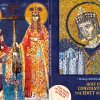In 1955, he was born in Derby, England. Resanovic moved to the United States where he has been a naturalized citizen since 1976. He holds degrees from the University of Akron and the Cleveland Institute of Music. He is currently a Professor of Music and the University of Akron.
Resanovic has composed numerous symphonic and choral works, symphonic band works, chamber and solo works, as well as some rather avant-garde electro-acoustic compositions. His works have been performed globally. His choral works are heavily influenced by Serbian music; Resanovic, of Serbian descent himself, has extensively studied the sacred chants of the Serbian Orthodox Church and has composed several volumes of liturgicial music.
Selected works
- alt.music.ballistix for clarinet and digital audio tape
- Crosstalk for E-flat alto saxophone and digital audio tape
- South Side Fantasy for solo double bass and Compact Disc
- Dance In A White Bay for orchestra, commemorating the crew of the Edmund Fitzgerald
- Drones and Nanorhytms for woodwind quintet
- Sonata for Euphonium and Piano for euphonium and piano
External links:





